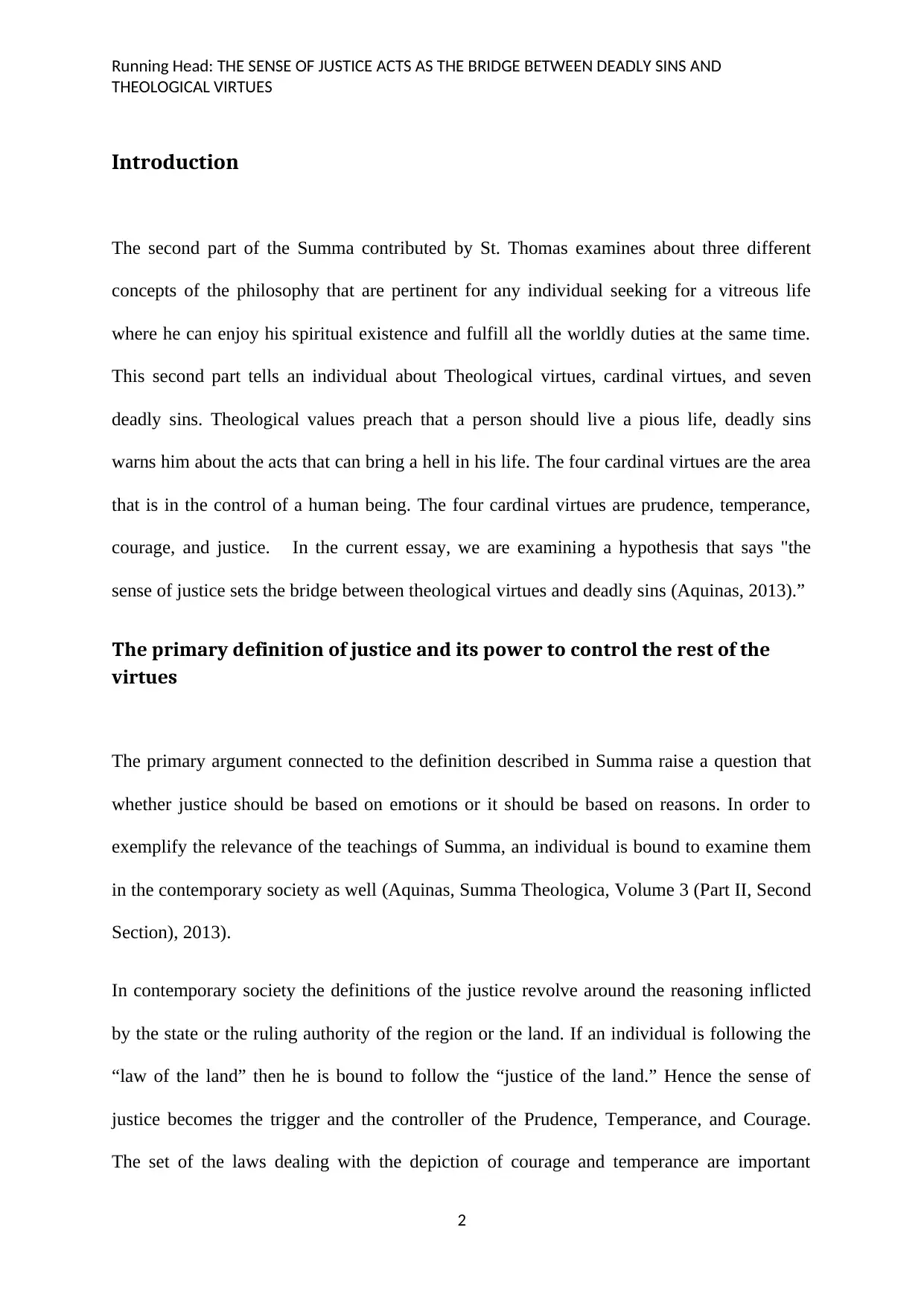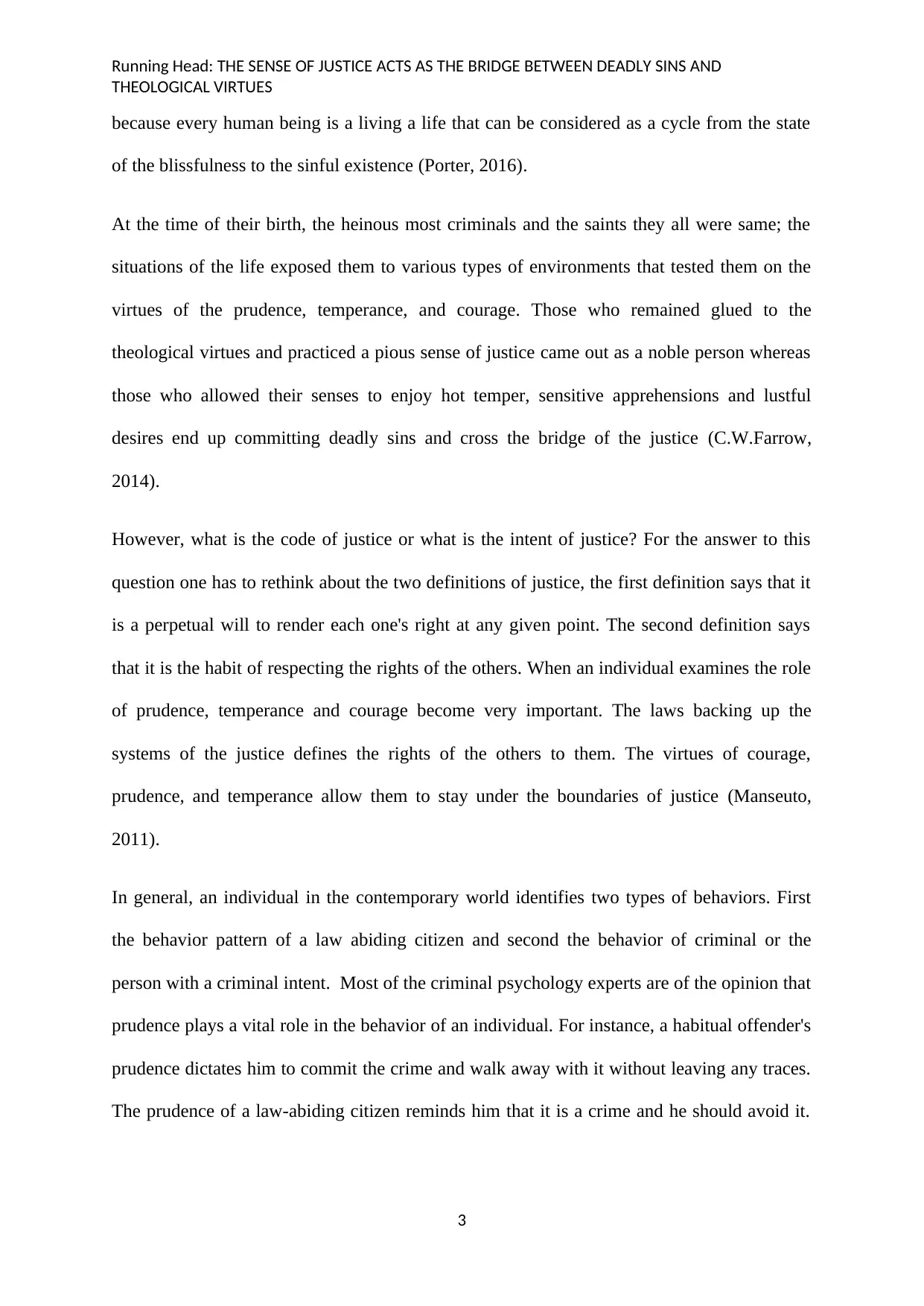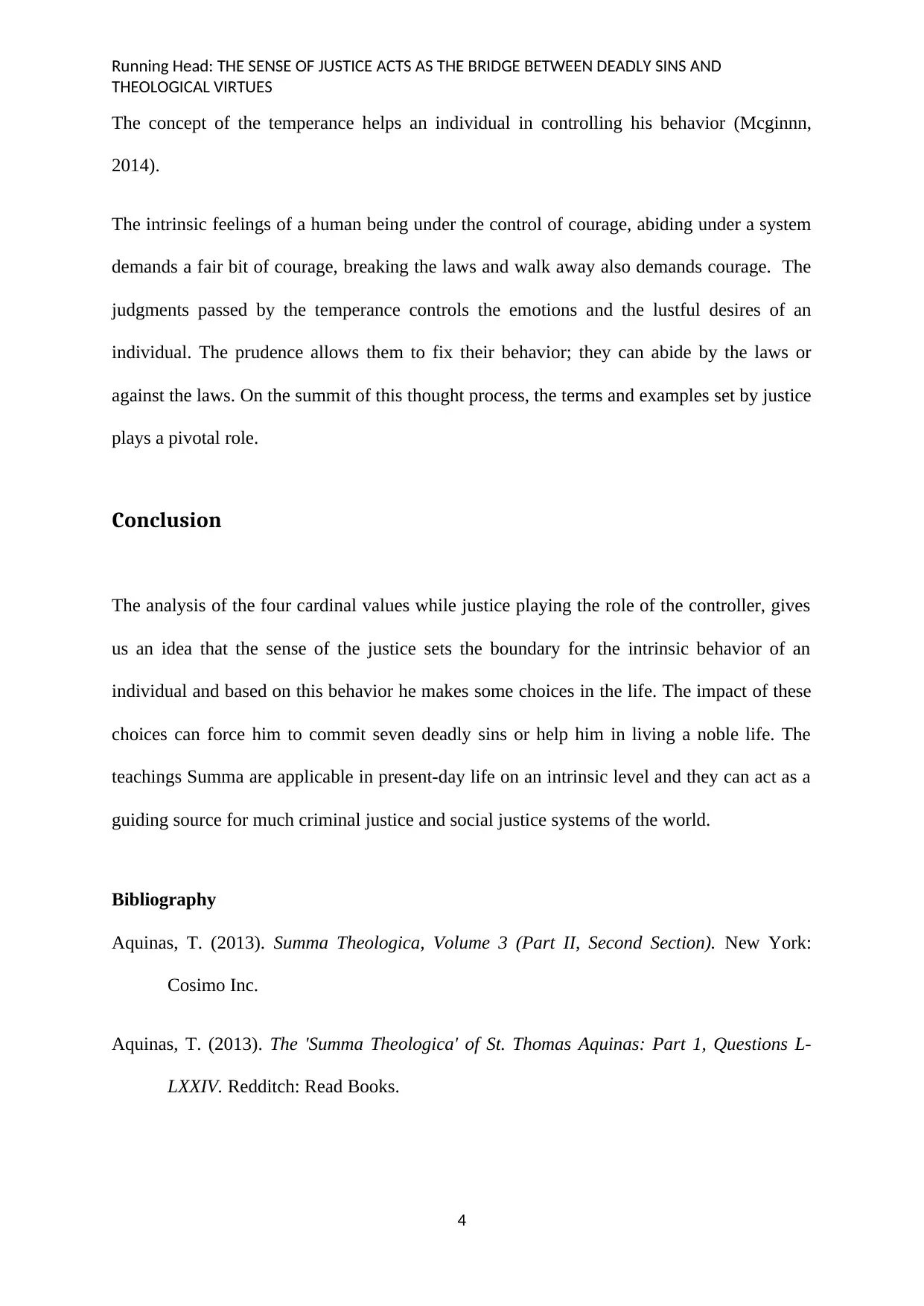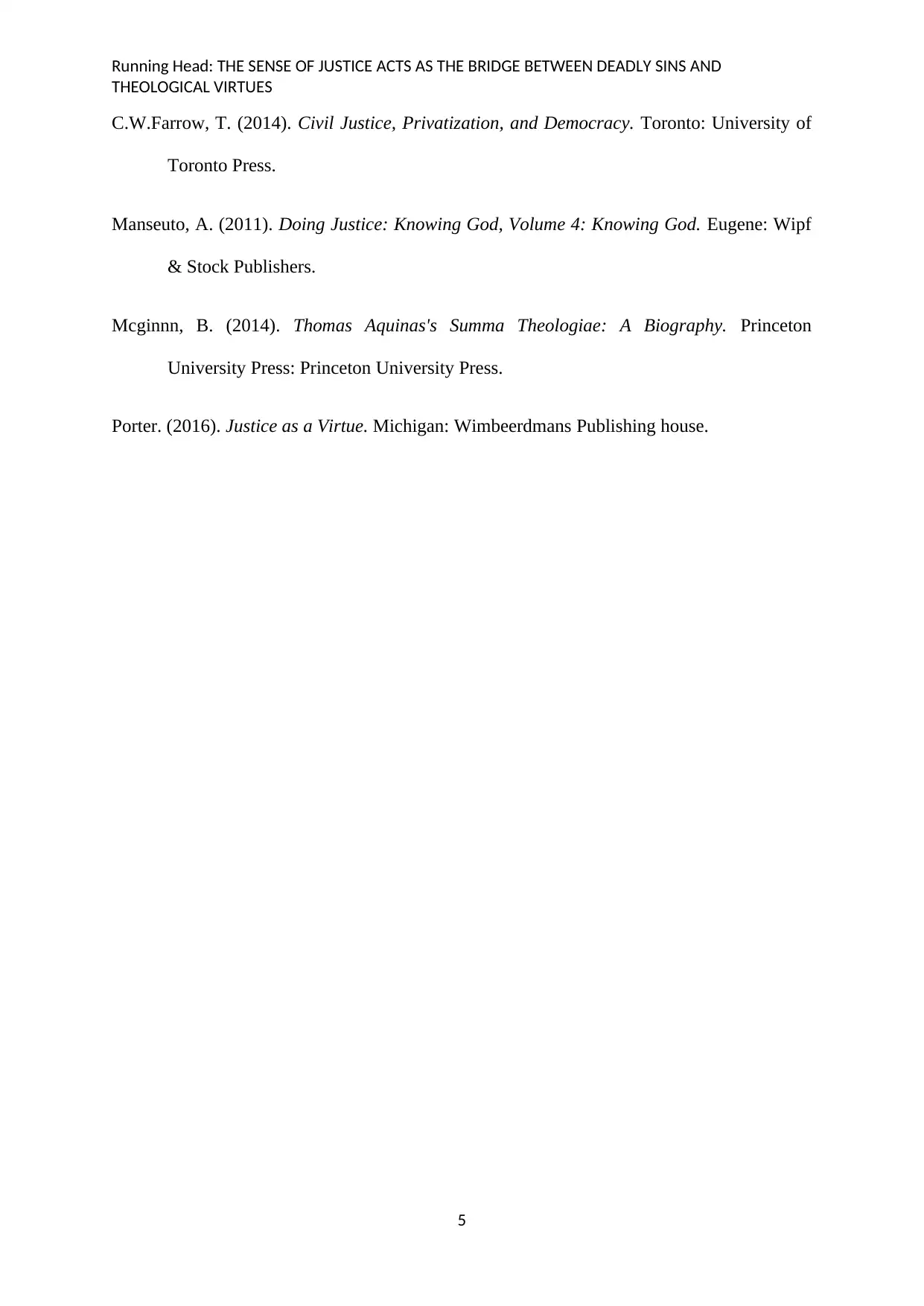Justice's Role: Deadly Sins, Theological Virtues, and Ethics
VerifiedAdded on 2021/10/06
|5
|1075
|181
Essay
AI Summary
This essay delves into the philosophical concepts presented by St. Thomas Aquinas, specifically examining the relationship between justice, theological virtues, and deadly sins. The core argument posits that the sense of justice acts as a crucial bridge, influencing an individual's behavior and choices. The essay explores how justice, as a cardinal virtue, interacts with prudence, temperance, and courage to shape actions, ultimately impacting whether one succumbs to deadly sins or embraces a virtuous life. By analyzing Aquinas's teachings within a contemporary context, the essay highlights the relevance of these principles in criminal justice and social justice systems. The discussion emphasizes how the laws and societal structures, which define justice, impact individual behavior and moral decision-making.

Running Head: THE SENSE OF JUSTICE ACTS AS THE BRIDGE BETWEEN DEADLY SINS AND
THEOLOGICAL VIRTUES
NAME
1
THEOLOGICAL VIRTUES
NAME
1
Paraphrase This Document
Need a fresh take? Get an instant paraphrase of this document with our AI Paraphraser

Running Head: THE SENSE OF JUSTICE ACTS AS THE BRIDGE BETWEEN DEADLY SINS AND
THEOLOGICAL VIRTUES
Introduction
The second part of the Summa contributed by St. Thomas examines about three different
concepts of the philosophy that are pertinent for any individual seeking for a vitreous life
where he can enjoy his spiritual existence and fulfill all the worldly duties at the same time.
This second part tells an individual about Theological virtues, cardinal virtues, and seven
deadly sins. Theological values preach that a person should live a pious life, deadly sins
warns him about the acts that can bring a hell in his life. The four cardinal virtues are the area
that is in the control of a human being. The four cardinal virtues are prudence, temperance,
courage, and justice. In the current essay, we are examining a hypothesis that says "the
sense of justice sets the bridge between theological virtues and deadly sins (Aquinas, 2013).”
The primary definition of justice and its power to control the rest of the
virtues
The primary argument connected to the definition described in Summa raise a question that
whether justice should be based on emotions or it should be based on reasons. In order to
exemplify the relevance of the teachings of Summa, an individual is bound to examine them
in the contemporary society as well (Aquinas, Summa Theologica, Volume 3 (Part II, Second
Section), 2013).
In contemporary society the definitions of the justice revolve around the reasoning inflicted
by the state or the ruling authority of the region or the land. If an individual is following the
“law of the land” then he is bound to follow the “justice of the land.” Hence the sense of
justice becomes the trigger and the controller of the Prudence, Temperance, and Courage.
The set of the laws dealing with the depiction of courage and temperance are important
2
THEOLOGICAL VIRTUES
Introduction
The second part of the Summa contributed by St. Thomas examines about three different
concepts of the philosophy that are pertinent for any individual seeking for a vitreous life
where he can enjoy his spiritual existence and fulfill all the worldly duties at the same time.
This second part tells an individual about Theological virtues, cardinal virtues, and seven
deadly sins. Theological values preach that a person should live a pious life, deadly sins
warns him about the acts that can bring a hell in his life. The four cardinal virtues are the area
that is in the control of a human being. The four cardinal virtues are prudence, temperance,
courage, and justice. In the current essay, we are examining a hypothesis that says "the
sense of justice sets the bridge between theological virtues and deadly sins (Aquinas, 2013).”
The primary definition of justice and its power to control the rest of the
virtues
The primary argument connected to the definition described in Summa raise a question that
whether justice should be based on emotions or it should be based on reasons. In order to
exemplify the relevance of the teachings of Summa, an individual is bound to examine them
in the contemporary society as well (Aquinas, Summa Theologica, Volume 3 (Part II, Second
Section), 2013).
In contemporary society the definitions of the justice revolve around the reasoning inflicted
by the state or the ruling authority of the region or the land. If an individual is following the
“law of the land” then he is bound to follow the “justice of the land.” Hence the sense of
justice becomes the trigger and the controller of the Prudence, Temperance, and Courage.
The set of the laws dealing with the depiction of courage and temperance are important
2

Running Head: THE SENSE OF JUSTICE ACTS AS THE BRIDGE BETWEEN DEADLY SINS AND
THEOLOGICAL VIRTUES
because every human being is a living a life that can be considered as a cycle from the state
of the blissfulness to the sinful existence (Porter, 2016).
At the time of their birth, the heinous most criminals and the saints they all were same; the
situations of the life exposed them to various types of environments that tested them on the
virtues of the prudence, temperance, and courage. Those who remained glued to the
theological virtues and practiced a pious sense of justice came out as a noble person whereas
those who allowed their senses to enjoy hot temper, sensitive apprehensions and lustful
desires end up committing deadly sins and cross the bridge of the justice (C.W.Farrow,
2014).
However, what is the code of justice or what is the intent of justice? For the answer to this
question one has to rethink about the two definitions of justice, the first definition says that it
is a perpetual will to render each one's right at any given point. The second definition says
that it is the habit of respecting the rights of the others. When an individual examines the role
of prudence, temperance and courage become very important. The laws backing up the
systems of the justice defines the rights of the others to them. The virtues of courage,
prudence, and temperance allow them to stay under the boundaries of justice (Manseuto,
2011).
In general, an individual in the contemporary world identifies two types of behaviors. First
the behavior pattern of a law abiding citizen and second the behavior of criminal or the
person with a criminal intent. Most of the criminal psychology experts are of the opinion that
prudence plays a vital role in the behavior of an individual. For instance, a habitual offender's
prudence dictates him to commit the crime and walk away with it without leaving any traces.
The prudence of a law-abiding citizen reminds him that it is a crime and he should avoid it.
3
THEOLOGICAL VIRTUES
because every human being is a living a life that can be considered as a cycle from the state
of the blissfulness to the sinful existence (Porter, 2016).
At the time of their birth, the heinous most criminals and the saints they all were same; the
situations of the life exposed them to various types of environments that tested them on the
virtues of the prudence, temperance, and courage. Those who remained glued to the
theological virtues and practiced a pious sense of justice came out as a noble person whereas
those who allowed their senses to enjoy hot temper, sensitive apprehensions and lustful
desires end up committing deadly sins and cross the bridge of the justice (C.W.Farrow,
2014).
However, what is the code of justice or what is the intent of justice? For the answer to this
question one has to rethink about the two definitions of justice, the first definition says that it
is a perpetual will to render each one's right at any given point. The second definition says
that it is the habit of respecting the rights of the others. When an individual examines the role
of prudence, temperance and courage become very important. The laws backing up the
systems of the justice defines the rights of the others to them. The virtues of courage,
prudence, and temperance allow them to stay under the boundaries of justice (Manseuto,
2011).
In general, an individual in the contemporary world identifies two types of behaviors. First
the behavior pattern of a law abiding citizen and second the behavior of criminal or the
person with a criminal intent. Most of the criminal psychology experts are of the opinion that
prudence plays a vital role in the behavior of an individual. For instance, a habitual offender's
prudence dictates him to commit the crime and walk away with it without leaving any traces.
The prudence of a law-abiding citizen reminds him that it is a crime and he should avoid it.
3
⊘ This is a preview!⊘
Do you want full access?
Subscribe today to unlock all pages.

Trusted by 1+ million students worldwide

Running Head: THE SENSE OF JUSTICE ACTS AS THE BRIDGE BETWEEN DEADLY SINS AND
THEOLOGICAL VIRTUES
The concept of the temperance helps an individual in controlling his behavior (Mcginnn,
2014).
The intrinsic feelings of a human being under the control of courage, abiding under a system
demands a fair bit of courage, breaking the laws and walk away also demands courage. The
judgments passed by the temperance controls the emotions and the lustful desires of an
individual. The prudence allows them to fix their behavior; they can abide by the laws or
against the laws. On the summit of this thought process, the terms and examples set by justice
plays a pivotal role.
Conclusion
The analysis of the four cardinal values while justice playing the role of the controller, gives
us an idea that the sense of the justice sets the boundary for the intrinsic behavior of an
individual and based on this behavior he makes some choices in the life. The impact of these
choices can force him to commit seven deadly sins or help him in living a noble life. The
teachings Summa are applicable in present-day life on an intrinsic level and they can act as a
guiding source for much criminal justice and social justice systems of the world.
Bibliography
Aquinas, T. (2013). Summa Theologica, Volume 3 (Part II, Second Section). New York:
Cosimo Inc.
Aquinas, T. (2013). The 'Summa Theologica' of St. Thomas Aquinas: Part 1, Questions L-
LXXIV. Redditch: Read Books.
4
THEOLOGICAL VIRTUES
The concept of the temperance helps an individual in controlling his behavior (Mcginnn,
2014).
The intrinsic feelings of a human being under the control of courage, abiding under a system
demands a fair bit of courage, breaking the laws and walk away also demands courage. The
judgments passed by the temperance controls the emotions and the lustful desires of an
individual. The prudence allows them to fix their behavior; they can abide by the laws or
against the laws. On the summit of this thought process, the terms and examples set by justice
plays a pivotal role.
Conclusion
The analysis of the four cardinal values while justice playing the role of the controller, gives
us an idea that the sense of the justice sets the boundary for the intrinsic behavior of an
individual and based on this behavior he makes some choices in the life. The impact of these
choices can force him to commit seven deadly sins or help him in living a noble life. The
teachings Summa are applicable in present-day life on an intrinsic level and they can act as a
guiding source for much criminal justice and social justice systems of the world.
Bibliography
Aquinas, T. (2013). Summa Theologica, Volume 3 (Part II, Second Section). New York:
Cosimo Inc.
Aquinas, T. (2013). The 'Summa Theologica' of St. Thomas Aquinas: Part 1, Questions L-
LXXIV. Redditch: Read Books.
4
Paraphrase This Document
Need a fresh take? Get an instant paraphrase of this document with our AI Paraphraser

Running Head: THE SENSE OF JUSTICE ACTS AS THE BRIDGE BETWEEN DEADLY SINS AND
THEOLOGICAL VIRTUES
C.W.Farrow, T. (2014). Civil Justice, Privatization, and Democracy. Toronto: University of
Toronto Press.
Manseuto, A. (2011). Doing Justice: Knowing God, Volume 4: Knowing God. Eugene: Wipf
& Stock Publishers.
Mcginnn, B. (2014). Thomas Aquinas's Summa Theologiae: A Biography. Princeton
University Press: Princeton University Press.
Porter. (2016). Justice as a Virtue. Michigan: Wimbeerdmans Publishing house.
5
THEOLOGICAL VIRTUES
C.W.Farrow, T. (2014). Civil Justice, Privatization, and Democracy. Toronto: University of
Toronto Press.
Manseuto, A. (2011). Doing Justice: Knowing God, Volume 4: Knowing God. Eugene: Wipf
& Stock Publishers.
Mcginnn, B. (2014). Thomas Aquinas's Summa Theologiae: A Biography. Princeton
University Press: Princeton University Press.
Porter. (2016). Justice as a Virtue. Michigan: Wimbeerdmans Publishing house.
5
1 out of 5
Your All-in-One AI-Powered Toolkit for Academic Success.
+13062052269
info@desklib.com
Available 24*7 on WhatsApp / Email
![[object Object]](/_next/static/media/star-bottom.7253800d.svg)
Unlock your academic potential
Copyright © 2020–2025 A2Z Services. All Rights Reserved. Developed and managed by ZUCOL.